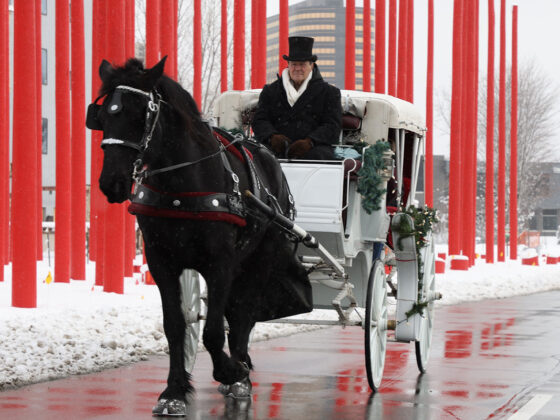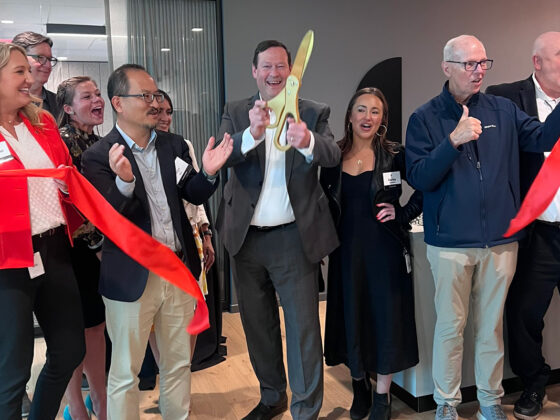 Chilly autumn air and a darkening sky set the stage for the inaugural Southfield City Centre Ghost Walk. On the evening of Tuesday, Oct. 22, an intimate crowd gathered to set off on the first of two scheduled six-stop historical walking tours to discover the hidden past of what is now a modern mini-urban walkable district.
Chilly autumn air and a darkening sky set the stage for the inaugural Southfield City Centre Ghost Walk. On the evening of Tuesday, Oct. 22, an intimate crowd gathered to set off on the first of two scheduled six-stop historical walking tours to discover the hidden past of what is now a modern mini-urban walkable district.
With Thaddeus Gunter, original Michigan surveyor from 1815, as their guide, participants took a journey through pre-colonial Southfield, to the days of the active Underground Railroad, and the celebration of accomplished educator and early settler Mary Thompson on the historic farm she bequeathed to the City of Southfield.
Along the way, guests learned how Southfield was settled, discovered how the City Centre advanced from acres of farmland bisected by a Native American trail that led south to Detroit, how Fannie Richards worked to bring equity to education, and how the city earned its name. They also learned some of the City Centre’s spookier histories, from ghostly sightings near the cemetery of the original Covenanter Church of Southfield to ancient Native American cures for scurvy and rattlesnake poisoning, to eerie sightings of early Southfield City Centre residents who met their untimely ends.
At Mary Thompson’s Farm, participants enjoyed cider and doughnuts and shared their thoughts about the event.
“I really enjoyed the experience of discovering something new about Southfield,” said Andy Curriston. He and his wife Liz Curriston moved to Southfield recently from Michigan’s Upper Peninsula, and said they enjoy exploring the Southfield City Centre on foot, something they started doing when they attended the Kimmie Horne Jazz Festival in August. They said they particularly enjoyed the narrative tone of Thaddeus Gunter, and the spooky crypt keeper who appeared in the church cemetery.
“It was fascinating to learn the history of the community,” said Rita Lewry, who lives in Birmingham and participated in the later of the two ghost walks. “The stories came alive through the narrators at each stop.” Tom Lewry agreed. “I enjoyed the first-person perspective because it made it more immediate,” he said.
Kathy Kelley of Southfield said she liked each stop on the ghost walk equally. “I liked them all, and it was worth it for the history,” she said.
 Each participant received a Southfield City Centre Trail Map and covered a three-quarter mile segment of the 7-mile shared-use path during the 75-minute ghost walk. The trail, which will see an expansion in the spring of 2020, is fast becoming a signature component of the City Centre, and guests learned just why one small portion of the path near Southfield Reformed Presbyterian Church remains narrower than the rest of the trail. The reason is enmeshed in a ghostly history of unmarked gravesites, and Heather Rockensuess of Southfield said she enjoyed piecing together the puzzle.
Each participant received a Southfield City Centre Trail Map and covered a three-quarter mile segment of the 7-mile shared-use path during the 75-minute ghost walk. The trail, which will see an expansion in the spring of 2020, is fast becoming a signature component of the City Centre, and guests learned just why one small portion of the path near Southfield Reformed Presbyterian Church remains narrower than the rest of the trail. The reason is enmeshed in a ghostly history of unmarked gravesites, and Heather Rockensuess of Southfield said she enjoyed piecing together the puzzle.
“I always wondered why the wide sidewalk suddenly narrowed,” she said. “I also like learning about the house fire and the history behind what was on that site where TGI Fridays is now.”
The event raised funds for the Southfield Historical Society and the Friends of the Southfield Public Arts, and was made possible by the volunteer efforts of a dedicated team from Southfield Department of Planning, Southfield Business and Economic Development, Southfield Public Arts Commission, Southfield Public Library, Southfield Parks & Rec, Southfield Area Chamber of Commerce, Southfield Public Schools, Lawrence Technological University, and many others.





